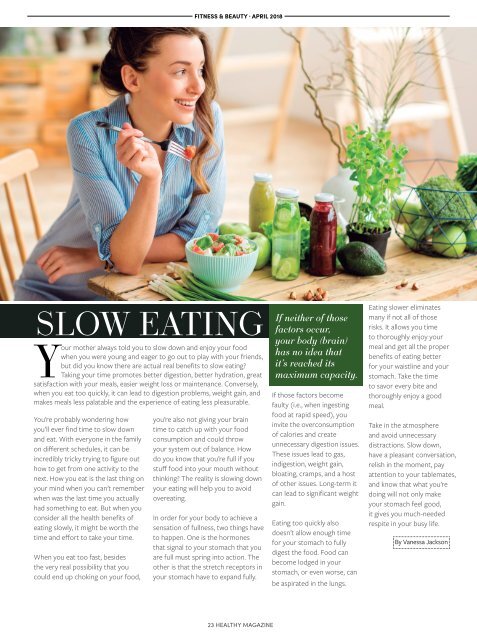Healthy RGV Issue 113
Create successful ePaper yourself
Turn your PDF publications into a flip-book with our unique Google optimized e-Paper software.
FITNESS & BEAUTY · APRIL 2018<br />
SLOW EATING<br />
Your mother always told you to slow down and enjoy your food<br />
when you were young and eager to go out to play with your friends,<br />
but did you know there are actual real benefits to slow eating?<br />
Taking your time promotes better digestion, better hydration, great<br />
satisfaction with your meals, easier weight loss or maintenance. Conversely,<br />
when you eat too quickly, it can lead to digestion problems, weight gain, and<br />
makes meals less palatable and the experience of eating less pleasurable.<br />
You’re probably wondering how<br />
you’ll ever find time to slow down<br />
and eat. With everyone in the family<br />
on different schedules, it can be<br />
incredibly tricky trying to figure out<br />
how to get from one activity to the<br />
next. How you eat is the last thing on<br />
your mind when you can’t remember<br />
when was the last time you actually<br />
had something to eat. But when you<br />
consider all the health benefits of<br />
eating slowly, it might be worth the<br />
time and effort to take your time.<br />
When you eat too fast, besides<br />
the very real possibility that you<br />
could end up choking on your food,<br />
you’re also not giving your brain<br />
time to catch up with your food<br />
consumption and could throw<br />
your system out of balance. How<br />
do you know that you’re full if you<br />
stuff food into your mouth without<br />
thinking? The reality is slowing down<br />
your eating will help you to avoid<br />
overeating.<br />
In order for your body to achieve a<br />
sensation of fullness, two things have<br />
to happen. One is the hormones<br />
that signal to your stomach that you<br />
are full must spring into action. The<br />
other is that the stretch receptors in<br />
your stomach have to expand fully.<br />
If neither of those<br />
factors occur,<br />
your body (brain)<br />
has no idea that<br />
it’s reached its<br />
maximum capacity.<br />
If those factors become<br />
faulty (i.e., when ingesting<br />
food at rapid speed), you<br />
invite the overconsumption<br />
of calories and create<br />
unnecessary digestion issues.<br />
These issues lead to gas,<br />
indigestion, weight gain,<br />
bloating, cramps, and a host<br />
of other issues. Long-term it<br />
can lead to significant weight<br />
gain.<br />
Eating too quickly also<br />
doesn’t allow enough time<br />
for your stomach to fully<br />
digest the food. Food can<br />
become lodged in your<br />
stomach, or even worse, can<br />
be aspirated in the lungs.<br />
Eating slower eliminates<br />
many if not all of those<br />
risks. It allows you time<br />
to thoroughly enjoy your<br />
meal and get all the proper<br />
benefits of eating better<br />
for your waistline and your<br />
stomach. Take the time<br />
to savor every bite and<br />
thoroughly enjoy a good<br />
meal.<br />
Take in the atmosphere<br />
and avoid unnecessary<br />
distractions. Slow down,<br />
have a pleasant conversation,<br />
relish in the moment, pay<br />
attention to your tablemates,<br />
and know that what you’re<br />
doing will not only make<br />
your stomach feel good,<br />
it gives you much-needed<br />
respite in your busy life.<br />
By Vanessa Jackson<br />
23 HEALTHY MAGAZINE
















